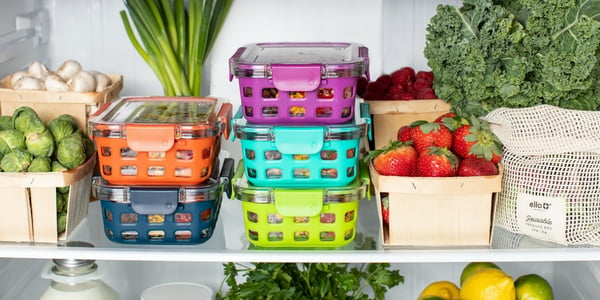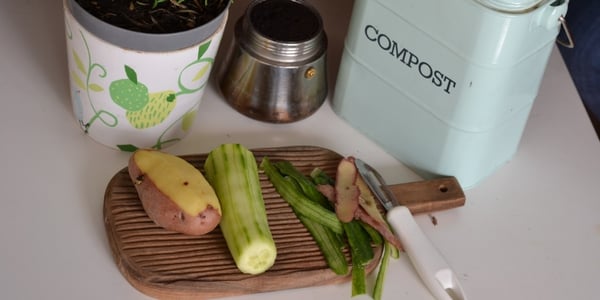The popularity of meal prep is steadily rising as more people become aware of its numerous...


The popularity of meal prep is steadily rising as more people become aware of its numerous...

Whether to help save the earth or to help save your wallet, there are many reasons to make efforts...

In recent years, the allure of the open road has captivated many, leading to a surge in RV travel....

For many, snacking has gone from just an occasional indulgence to a frequent habit that’s...
15 Easy Ways to Avoid Eating Out
Eating out is commonly one of the most enjoyable parts of our day. It can be a nice break from our routine, a chance to try something new and experience something different, or an excuse to treat ourselves to a bit of pampering. But, if you're eating out frequently, it can become a significant burden on your wallet and health.
No matter why you frequently eat out, you may break the habit, eat healthier food, and save a lot of money. In fact, if you're anything like the typical American, eating at home will save you nearly $3,000 a year compared to eating out. While eating out is convenient and understandable given everyone's hectic schedules, the costs may quickly rise.
That said, we've compiled several great tips to help you achieve your goal of eating out less!
15 Ways You Can Avoid Eating Out
1. Meal Plan
The more prepared you are, the more likely you are to follow through with your meal plan, whether it’s for the day or the entire week. Unplanned, spur-of-the-moment meals are excellent, but they frequently lead toward unplanned, spur-of-the-moment takeout.
2. Prep for the Week
Try to prepare meals for the entire week by doubling or tripling the quantity of whatever you are preparing and storing. Purchase the appropriate containers to make freezing extra food simple. Then, all you have to do is quickly heat up a plate of food instead of cooking 2-3 times a day when you want to eat at home.
3. Stock up on Meals to Prepare Quickly
Stocking up on quickly prepared meals is better than going out, even if it means reducing your from-scratch standards. Make sure you have enough frozen ravioli, pierogis, pizzas, and other quick-meal options on hand, such as canned soup, frozen stir-fry mix vegetables, and vacuum-packed curries.
Having things readily available is helpful since it saves time from having to go grocery shopping. When your pre-made meals are running out, having these items on hand can be the difference between an easy dinner at home and feeling like you have to go out to eat because the fridge is empty.
4. Keep Dinner Simple
You may have grown up with three or four-course dinners. Although we frequently feel under pressure to uphold this tradition, there are occasions when it simply isn't possible or sensible. Making several different meals can be time-consuming.
Therefore, don't feel pressured to make dinner into a big event every day. For the kids, cook some chicken nuggets. Make yourself a salad or whip up some pasta quickly. Dinner should primarily serve as a filling meal, so prioritize quality over quantity.
5. Make Your Lunch Every Day
Many of us eat out at lunch. It's a convenient but pricey choice. Even eating from the value menu adds up. By packing a lunch every day, you can make lunchtime healthier. Bring sandwiches, wraps, salads, or the night before's leftovers. You can bring quick frozen items such as burritos, pizzas, and pasta meals with you if the break room at your workplace or wherever you eat lunch has a microwave. In your grocery store's freezer section, there are many delectable and reasonably priced options.
6. Eat Before Going to Events or Running Errands
Eating before events or running errands helps you avoid eating out, meaning you can cut down on the calories you consume and save money. Often, we eat out because we get hungry while we are already outside of the house. Whether you're out watching a movie or shopping at the mall, it's easy to get tempted to grab a meal while you're on the go. Instead, eat before you leave the house to help reduce your urge for an impulsive purchase.
7. Creating Written Goals
Identify your goal. Are you attempting to achieve anything about your finances, health, well-being, or weight loss? Maybe you want to lose weight for a big event coming up, or perhaps you're saving up for a meal at a high-end restaurant you've wanted to experience for a long time. Put that in big letters on your fridge and constantly remind yourself that staying in is a step closer to your goal. Give yourself a minimum wait period, such as 48 or 72 hours, if your craving for a particular restaurant is intense.
8. Learn to Say No
It's hard to say “no” when someone insists you go out for food. We're all conditioned to continually say "yes" to take people up on their offers so we can continue to eat out. It becomes easy if we don't make it the most critical aspect of our lives. So try to say "No". You aren't obligated to eat out whenever you are invited, and it will make it more special when you go out with others. Alternatively, if you want to spend time with others without eating out, consider proposing another activity with them instead of eating, or invite them to your home for a meal or a picnic!
Avoiding eating out is just one way to save money. Click here or the button below to open a TopLine Financial Credit Union savings account!
9. Learn to Make Your Favorite Restaurant Meals
To satisfy your family's desires, determine which foods are their favorites and start making meals that taste just like the originals. For instance, if your spouse likes burgers, you can freeze homemade, seasoned burger patties and burger buns. Grill a couple of the patties, toast some hamburger buns, add cheese, and then slather some ketchup on them. Viola!
10. Eat Leftovers
Instead of letting leftovers go to waste, incorporate them into future meals. Get creative and repurpose last night's dinner into a completely new dish. For example, turn leftover roasted vegetables into a frittata or use yesterday's grilled chicken to top a salad. By planning your meals to include leftovers, you'll not only save time and money but also reduce food waste and minimize the temptation to eat out.
11. Eat Your Homemade Meal Away From Home
Sometimes, "dining out" is what one needs for a change of environment or mood more than for the meal itself. Consider having a picnic and eating it somewhere else than in your home. For example, you can stick to your diet and save money by eating homemade meals in a local park.
12. Bring Snacks Wherever You Go
When out and about, hunger is a significant factor in unexpected restaurant and fast food costs. Stock up on snacks like nuts, granola bars, wraps, crackers, or chocolate to munch on when hungry.
13. Use Paper Plates
The after-meal cleanup is one of the reasons why many people dislike eating at home. Dishwashing can be a headache. If this applies to you, make life easier by always having paper plates on hand. If utilizing paper plates only once a week helps you save time and reduces your stress level, then go ahead and do it.
14. Explore Budget-Friendly Recipes
Take some time to research and experiment with budget-friendly recipes that are easy to prepare at home. Look for dishes that use affordable ingredients and require minimal cooking time. Websites and cookbooks dedicated to budget-friendly cooking can provide plenty of inspiration. Expanding your repertoire of homemade meals will make you less tempted to dine out and more confident in your ability to whip up delicious meals at home.
15. Find Recipe Inspiration Online
Expand your culinary horizons by following recipe blogs and social media accounts specializing in easy-to-make, budget-friendly meals. Look for accounts that offer meal planning tips, ingredient substitutions, and cooking hacks to help you save time and money in the kitchen. By regularly browsing through new recipes and meal ideas, you'll stay inspired to cook at home and avoid the temptation of eating out. Additionally, engage with the cooking community by sharing your at-home cooking successes and asking for advice or recommendations.
Switching from eating out to cooking at home can take more time and energy, but it's worth it. You don't have to be the best chef in the world or prepare each ingredient from scratch. Meal prepping and planning can help you save money on food while also enhancing the nutritional value of your diet.
Start saving even more money by earning cash back on your groceries. Click here to apply online for a TopLine Financial Credit Union credit card!
Living50+